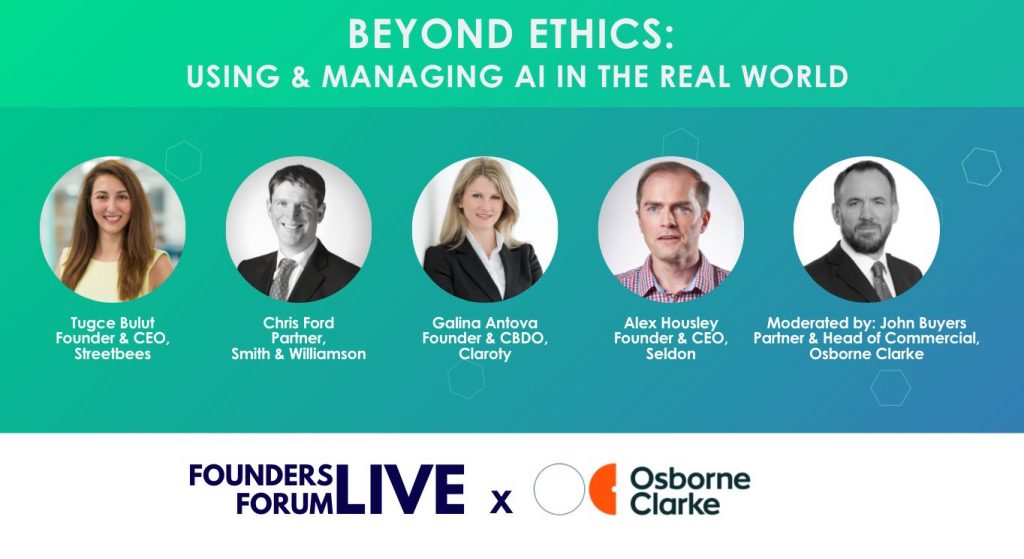On September 23rd, Founders Forum kickstarted the second season of FF Live with a deep dive session in collaboration with Osborne Clarke entitled “Beyond Ethics: using and managing AI in the real world”.
The discussion was led by John Buyers, Partner & Head of Commercial, Osborne Clarke with guest speakers from the FF community including Tugce Bulut, Founder & CEO, Streetbees, Chris Ford, Partner, Smith & Williamson, Galina Antova, Founder & Chief Business Development Officer, Claroty, and Alex Housley, Founder & CEO, Seldon.
The discussion centred on opportunities around AI infrastructure and digital transformation, regulation of open source software, cyber security and ethical agendas.
We would like to offer our thanks to Tugce, Chris, Galina, Alex, and John for generously giving their time, alongside the 110+ attendees to the session for their contributions.

The following insights emerged from the discussion:
—
1.It is vital to understand how and why data is being collected to prevent data bias and maximise the performance of an algorithm
- AI algorithms cannot function without data – it trains the neural networks and creates more robust systems the larger and more varied the datasets used
“AI and data are completely inseparable topics” – Tugce Bulut, Streetbees
- As such, the collection of data is of primary importance. In order to prevent biases in neural networks, it is essential to collect from a variety of demographics including location, gender, age, and social background
- It is therefore necessary for organisations to understand how and why the data they use in algorithms is being collected in order to maximise the output of any algorithm
2.There is a major opportunity for digital transformation in the industrial sector, yet many corporates are hesitant to change due to the fallacy of sunk costs
- A great untapped opportunity exists within the infrastructure of industrial companies (such as construction and manufacturing) due to the defined nature of machine to machine communications
“There is no bigger opportunity for digital transformation than the industrial companies” – Galina Antova, Claroty
- However, legacy corporates have invested millions or billions of dollars into their tech infrastructure over long periods, meaning it it not easily upgraded and many are reluctant to act
- It can, however, be fine-tuned and improved, with numerous credible startups using AI and machine learning on data sets in sectors such as healthcare to make marginal improvements
- While not the ultimate solution, the fine-tuning legacy of equipment can often improve its performance or extend its life by small percentages, which, at scale, can mean large savings for global organisations
- Examples of this tuning include collecting operational data and using tech to anticipate maintenance requirements
3.Open source is key to the development of many AI algorithms, but it needs policing from organisations and corporates to avoid malicious activity and bias
“It is essential that core AI technology and infrastructure is open source” // “It’s hard to audit and enforce the use of open source software” – Alex Housley, Seldon
- The underlying algorithms for many AI products are open source, and should remain to allow for wider adoption and the acceleration of R&D
- However, a key vulnerability of open source is that there is little to no enforcement around the ethical uses of the software: auditing and regulating its use through licensing would help limit the efforts of those trying to use AI for harm or employing bias-laden approaches to development
4.The growing use of AI in cyberattacks is forcing corporates and governments to invest in defensive capabilities
- Given the critical importance of tech networks to a company’s operations, cyberattacks have proliferated in recent years, and are using more and more AI capabilities in their attacks
- One key area is the use of ransomware, which paralyses organisations’ ability to do business, meaning there are often quick pay-outs to attackers
“[There is] increasing sophistication in terms of the use of AI to conduct cyber attacks” – John Buyers, Osborne Clarke
- For nation states, these types of attacks can be used as a form of economic warfare, an increasing threat in light of escalating geopolitical tensions
- Currently AI is helping defence and offence more or less equally, but companies and governments must keep investing in their defensive capabilities to ensure parity with malicious actors
—
Founders Forum is Europe’s pre-eminent entrepreneur network, gathering founders and senior executives alongside government and thought leaders to discuss, debate and collaborate on the impact of technology on industries and society.
#FFLive is the home for all Founders Forum’s virtual events, seeking to recreate the magic of Founders Forum wherever we are in the world. For more information on the FF Live series, follow us on LinkedIn and sign up to our newsletter, Founders News.
Founders Forum has also built a family of businesses, supporting entrepreneurs at every stage of their journey, across advisory, executive search, giving, diversity and inclusion, education and more.
 All Posts
All Posts


